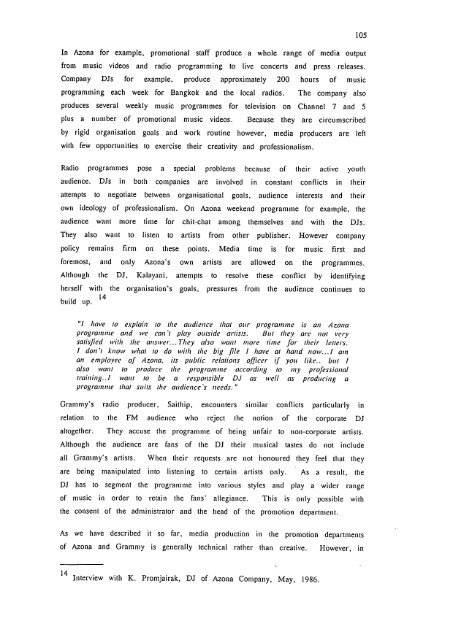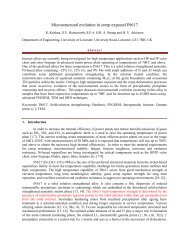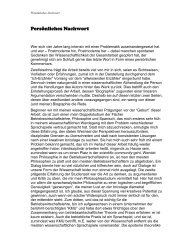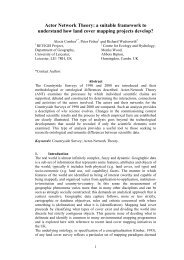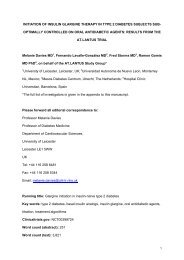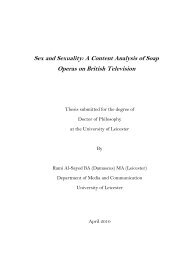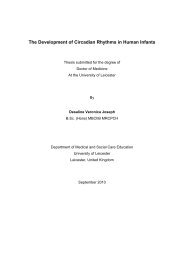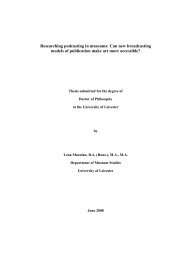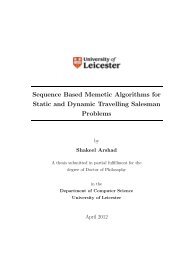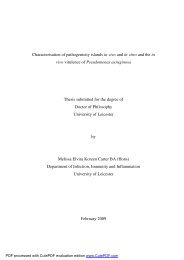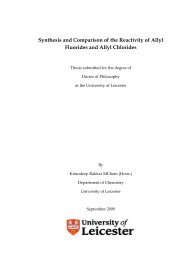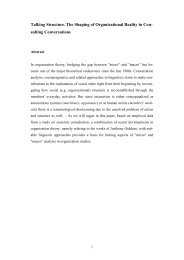iieiiei1eWrkers - Leicester Research Archive - University of Leicester
iieiiei1eWrkers - Leicester Research Archive - University of Leicester
iieiiei1eWrkers - Leicester Research Archive - University of Leicester
You also want an ePaper? Increase the reach of your titles
YUMPU automatically turns print PDFs into web optimized ePapers that Google loves.
In Azona for example, promotional staff produce a whole range <strong>of</strong> media output<br />
from music videos and radio programming to live concerts and press releases.<br />
Company DJs for example, produce approximately 200 hours <strong>of</strong> music<br />
programming each week for Bangkok and the local radios. The company also<br />
produces several weekly music programmes for television on Channel 7 and 5<br />
plus a number <strong>of</strong> promotional music videos. Because they are circumscribed<br />
by rigid organisation goals and work routine however, media producers are left<br />
with few opportunities to exercise their creativity and pr<strong>of</strong>essionalism.<br />
Radio programmes pose a special problems because <strong>of</strong> their active youth<br />
audience. DJs in both companies are involved in constant conflicts in their<br />
attempts to negotiate between organisational goals, audience interests and their<br />
own ideology <strong>of</strong> pr<strong>of</strong>essionalism. On Azona weekend programme for example, the<br />
audience want more time for chit-chat among themselves and with the DJs.<br />
They also want to listen to artists from other publisher. However company<br />
policy remains firm on these points. Media time is for music first and<br />
foremost, and only Azona's own artists are allowed on the programmes.<br />
Although the DJ, Kalayani, attempts to resolve these conflict by identifying<br />
herself with the organisation's goals, pressures from the audience continues to<br />
14<br />
build up.<br />
"I have to explain to the audience that our programme is an ,lzona<br />
prograinnie and we can 't play outside artists. But the y are no! very<br />
satisfied wi/li the answer... They also waiit more time for their letters.<br />
I don't know what to do with the big file / have at hand now... I am<br />
an emplo yee <strong>of</strong> Azona. its public relations <strong>of</strong>ficer if you like., but I<br />
also waiit to produce the program,ne according to my pr<strong>of</strong>essional<br />
training. .1 want to be a responsible Di as well as producing a<br />
programme 1/ia! suits the audience's needs.<br />
Graniniy's radio producer, Saithip, encounters similar conflicts particularly in<br />
relation to the FM audience who reject the notion <strong>of</strong> the corporate DJ<br />
altogether. They accuse the programme <strong>of</strong> being unfair to non-corporate artists.<br />
Although the audience are fans <strong>of</strong> the DJ their musical tastes do not include<br />
all Grammy's artists. When their requests are not honoured they feel that they<br />
are being manipulated into listening to certain artists only. As a result, the<br />
DJ has to segment the programme into various styles and play a wider range<br />
<strong>of</strong> music in order to retain the fans' allegiance. This is only possible with<br />
the consent <strong>of</strong> the administrator and the head <strong>of</strong> the promotion department.<br />
As we have described it so far, media production in the promotion departments<br />
<strong>of</strong> Azona and Grammy is generally technical rather than creative. However, in<br />
14 . .<br />
Interview with K. Promjairak, DJ <strong>of</strong> Azona Company, May, 1986.<br />
105


